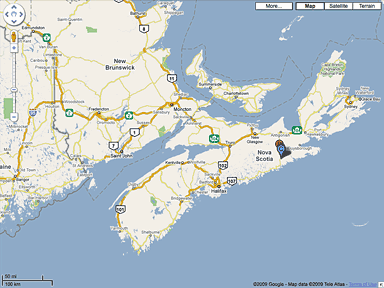We had plenty of warning about
Hurricane Bill here in Atlantic Canada - from the time it first
started gathering strength at the doorstep of the Caribbean over a week
ago. All week obsessive storm-watchers like me tracked Bill's progress
on its way north, with Nova Scotia and Newfoundland in its crosshairs,
the forecasters told us.
It's very early in the season for a major tropical depression to
find its way into our waters - a whole month earlier than the last
really bad one - Hurricane Juan on
September 29, 2003. However, global warming seems to be having an
effect, and with our ocean waters off the east coast several degrees
warmer than normal for the time of year, plus a record-setting warm,
humid air mass that has been sitting over us for the past 10 days or
so, there were not many dynamics in play to take the vinegar out of
Bill before he arrived, so it was nail-biting time.

Charles Moore lives in Nova Scotia, Canada.
Funny about hurricanes: My wife's relatives in Bermuda were actually
hoping Bill would pass close enough (but not too close of course) to
them to dump some significant rainfall, since the island, which depends
heavily on roof catches and storage tanks for its water supply, has
been suffering through a prolonged dry spell. Bill obliged the
Bermudians on both counts, but how would he treat us farther north?
I spent a fair bit of Friday and Saturday battening down and
preparing, while Bill remained pretty consistently on the track that
the NOAA and Environment Canada had projected all week, which would
bring the storm very close to the Nova Scotia Atlantic coast (which is
where I happen to live, within sight of the ocean). I filled empty
space in the freezer with water containers to provide more cold mass in
case of a prolonged power outage, made sure my power pack and other 12
volt batteries were fully charged, as well as all laptop batteries, and
that we had plenty of spare flashlight batteries on hand.
With up to 6" (150 mm) of rain forecast, I made sure the road
culvert at the foot of our driveway that clogged with debris and caused
a washout in a big rainstorm a couple of years back, was clear, and
last evening spent an hour or so with a shovel and shears clearing
vegetation and sediment from other drainage pathways before hunkering
down for the night in anticipation of Bill's arrival Sunday
morning.
We have had only one relatively brief power outage here since I
bought my Unibody
MacBook last winter, and it occurred to me that if we did
experience a prolonged power interruption, I wouldn't be able to run
the MagSafe connector equipped MacBook from my old but trusty
Kensington 70 Watt Auto-Air power adapter and a 12 volt car battery
as I have done in the past with my Pismos and aluminum PowerBook G4, so I
made sure I had a fresh global file backup done on the PowerBook in
case I had to revert to it temporarily.
I do have a 300 watt power converter, but I find they're an
inefficient mode of running computers off 12V battery power, since the
inverter itself uses a significant amount of juice just to run itself,
and the conversion back down to laptop voltage using the AC power
adapter adds another layer of energy-conversion wastage.
Apple does make a MagSafe Airline adapter, but it's limited to only
powering your MacBook in airlines and does not work in
automobile cigarette-lighter type sockets. "Dog-in-the-manger-ish,"
Apple has so far refused to license its proprietary MagSafe AC adapter
technology to any third parties, such as Kensington, who might supply
an auto=compatible adapter for Intel MacBooks. An independent firm
called Mikegyver
does offer a Kensington 120 Watt AC/DC car/airline adapter converted
with a MagSafe unit, but it sells for $160, which is a bit steep (they
will also convert your existing MagSafe adapter for $55), and also a
Refurbished Kensington 70w AC/DC adapter with MagSafe conversion for
MacBook Air, but these workarounds are a bit on the expensive side and
not an authorized MagSafe solution.
What's wrong with Apple? Do they not imagine that lots of folks
would like to be able to power their MacBooks from auto or boat power?
The lack of availability certainly does negate a fair bit of a laptop
advantage in power blackouts.
As for Hurricane Bill, his arrival turned out to be a bit of an
anticlimax, about which I am not complaining in the slightest. The
storm passed us as a strong category one hurricane packing winds of 75
knots but not making landfall, and while we did get several hours of
pretty heavy wind and torrential rain, by late Sunday afternoon the sun
was peeking through, winds had diminished to stiff breezes, and it was
nice enough that my wife and I decided to hike to the beach to check
out the wave action, which was as spectacular as I'd ever seen it
there, with the wind having swung around to the northwest and blowing
the tops off of incoming wave commerce in explosions of spindrift.
The wind did pick up again for a couple of hours in the evening as
the eye of the storm left our longitude headed for Newfoundland, still
as a Category One hurricane, and at one point Sunday afternoon the
provincial power utility reported that some 30,000 service addresses
were without power - but ours didn't go off, and never even flickered.
There was some shoreline damage from wave action and washouts and some
flooding in certain areas, but damage-wise we got off rather lightly
compared with our encounter with the much smaller but more powerful
Juan six years ago, which came ashore and caused eight deaths as well
as leaving a great deal of destruction in its path.
Happily, they also fared well in Newfoundland today.



